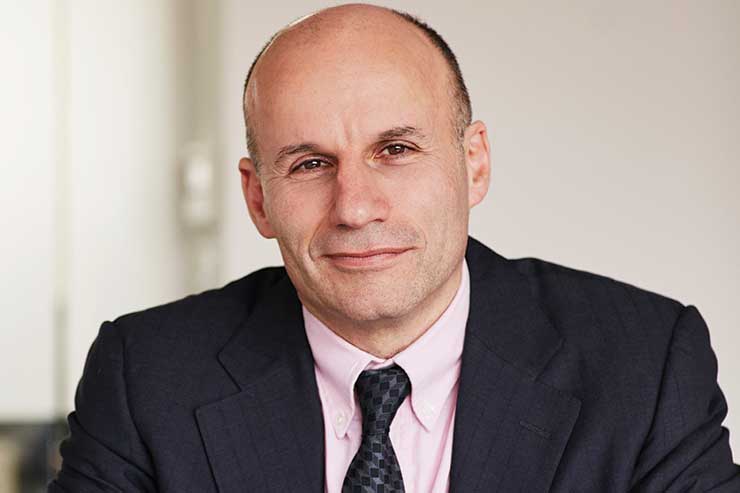‘2019 is going to be a good year’ – Tanzer
 Sophie Griffiths
Sophie GriffithsAs we enter the crucial first months of 2019, Sophie Griffiths quizzes Abta chief Mark Tanzer on Brexit and everything after
“This is becoming a tradition,” Abta chief executive Mark Tanzer remarks with a wry smile, and I’m not sure if he’s referring to TTG’s annual interview with him or the fact that the opening question is identical to last year’s: “What will Brexit mean for travel in the year to come?”
His answer, “who really knows?”, is also the same as a year ago and underlines the uncertainty that has plagued the travel industry – and the UK at large – for the last two-and-a-half years.
And yet in spite of the continued doubt over the country’s political situation, Abta’s chief is refreshingly optimistic about 2019.
“Brexit is more about frustration than gloom,” he says. “It’s not an easy thing to leave the EU. We’ve had 40 years of integration, so whatever happens isn’t easy. But everyone wants the UK [to flourish].”
His hopeful outlook is particularly noteworthy given the political fallout in recent weeks and mounting concern that the UK is headed for a no-deal Brexit.
And especially so given that we meet two days after Theresa May survived a no confidence vote, and a day before EU leaders rejected renegotiations on the withdrawal agreement – with EU chief Jean-Claude Juncker allegedly branding the PM as “nebulous”.
One could forgive Tanzer, then, for being a little apprehensive about the year ahead. He insists, though, that Abta is working hard to ensure the government is aware of just how damaging a no-deal Brexit would be for travel, and it seems at least some MPs are listening.
Last month, Tom Brake, Liberal Democrat MP for Carshalton and Wallington, told the Commons he had met with Abta to discuss the association’s concerns over Brexit, which he then put to chancellor Philip Hammond.
“That was certainly helpful,” Tanzer smiles. “We meet with various MPs and we happened to bring it up and Tom had the opportunity to put that point to the chancellor shortly after we had spoken. Nobody wants a no deal,” Tanzer insists.
His optimism has been boosted by assurances flying rights will be maintained between the UK and EU should the UK crash out of the EU without a deal.
“We know now that in the event of a no-deal scenario, planes will still fly [the EU Commission published guidance in November confirming this]. The EU is due to publish more guidance on this,” he adds, “but they’ve indicated to the government that flights will continue.”
Tanzer is unequivocal, though, about other potential ramifications for the industry in the event of a no deal. “All the disruption in Dover will be quite difficult for our members. We are urging politicians to avoid a hard Brexit.”
I ask if Abta is also meeting with Brexit hardliner MPs. “We’re making these points to everyone,” he insists. “We are politically agnostic – we’re meeting with politicians of all stripes. We just want to avoid a no-deal exit.”
And, Tanzer says, MPs are understanding. “When we give our message to all politicians, we like to think they know we are an authority. We have looked at all the implications of a no deal for our members – for instance, whether they will have to have different terms in their contracts or what will happen to their staff overseas. So when we speak to MPs we have the evidence to back it up.
“And even if [May’s] deal gets passed, we’ve got to still continue to publish a lot of things we’ve been working on – for instance the ability to post workers to the EU.
These have been agreed on both sides [if the PM secures a deal] but until it’s all confirmed and in black and white our lobbying won’t end. It will continue until the end of 2020 [the end of the transition period]. Both sides win with tourism,” he adds. “It’s an important part of EU GDP, and no one wants to lose that. If they [MPs] hadn’t taken notice I would be worried, but they have understood.”
Practical advice
For now, Tanzer is focused on maintaining consumer confidence. “We’re not doing a big consumer scare campaign, so no one can say we’re part of Project Fear – it’s all practical advice,” he points out.
Knowing what he knows now, and how close we have come to exiting the EU with no deal, I question whether Tanzer wishes Abta (which maintained a neutral position on the referendum) hadn’t been so politically agnostic during the Brexit vote of 2016.
“At the referendum, we said that it was for the industry to decide,” he replies. “All I can talk about is the travel aspects – we said at the time ‘this is our analysis of Brexit’ and we pointed out there are more downsides than upsides with things such as open skies, consumer rights and the value of the pound.
“I don’t think we should always remain politically agnostic,” he reflects. “But Brexit was so personal – we have members that are pro- Brexit and those who are against. It’s difficult to generalise across that.
“We took a view that we would have more authority if we limited our contribution to an area we can talk confidently about, which is travel.”
So what if there was a second referendum? “Because we know more now about what a no-deal exit would look like, we’d probably be more vocal and more informed,” he acknowledges. “Our public common objective is being practical but also to maintain confidence so people know they can fly.”
Crucial period
His point about consumer confidence is key, not least with the arrival of peaks. However, Tanzer says Abta is wary of carrying out a big Brexit-related consumer campaign in case it prompts more questions than it answers.
“We probably won’t go out there with a big campaign to say there’s not a problem because people will then think there is a problem.
“But we are very aware that January and February are an important booking time for members. We have our annual Travel with Confidence adverts [which started on December 25] across national radio stations,” he adds.
Abta has also been running adverts on Facebook and Instagram to encourage holidaymakers to visit its Brexit advice page.
Reducing regulations
Of course, there are other issues facing the sector aside from the B word. This year does at least “look quieter” on the regulatory front than 2018, which Tanzer acknowledges was “extraordinary”, but he says there are still some issues to be aware of.
This includes a review of the new Package Travel Regulations, which Tanzer says the EU will start in 2019. “They’re keen to look at how new structures like Linked Travel Arrangements are working in practice,” he says.
There is also the Airline Insolvency Review, initially due at the back end of last year and now due imminently.
“We’ve been very engaged in helping with the review,” Tanzer says. So what is he hoping for?
“We want to see consistency,” he says. “If the government is going to bring everyone home when there’s a failure then they need to do that on a consistent basis. The middle ground they have at the moment [as demonstrated by the repatriation of all Monarch’s customers, regardless of their protection] doesn’t seem to work.”
Elsewhere, Tanzer praises the “falling off in the growth of false sickness claims”, which he attributes to the introduction of fixed legal costs for the sector as well as the publicity around several court cases which saw some fraudulent claimants receiving jail sentences.
He insists though: “We’re not relaxing at all. We don’t want the problem to re-emerge as a different issue in the travel sector.”
Abta will also not be relaxing its focus on keeping the sector feeling optimistic as it braces itself for a turbulent few months.
“I am feeling positive,” Tanzer insists. “I think people will start really looking forward and opening their eyes – not just because we’re leaving the European Union, but because we’ve had a bit of introspection recently. Consumers will be looking for new experiences in travel – and the industry has been very innovative at coming up with new experiences.
“The underlying demand for travel has never abated, and even in December bookings were up for members year-on-year for 2019. Yes, Brexit isn’t easy,” he smiles. “But I’m feeling positive. 2019 is going to be a good year.”
Sign up for weekday travel news and analysis straight to your inbox

Sophie Griffiths
Supplier Directory
Find contacts for 260+ travel suppliers. Type name, company or destination.














